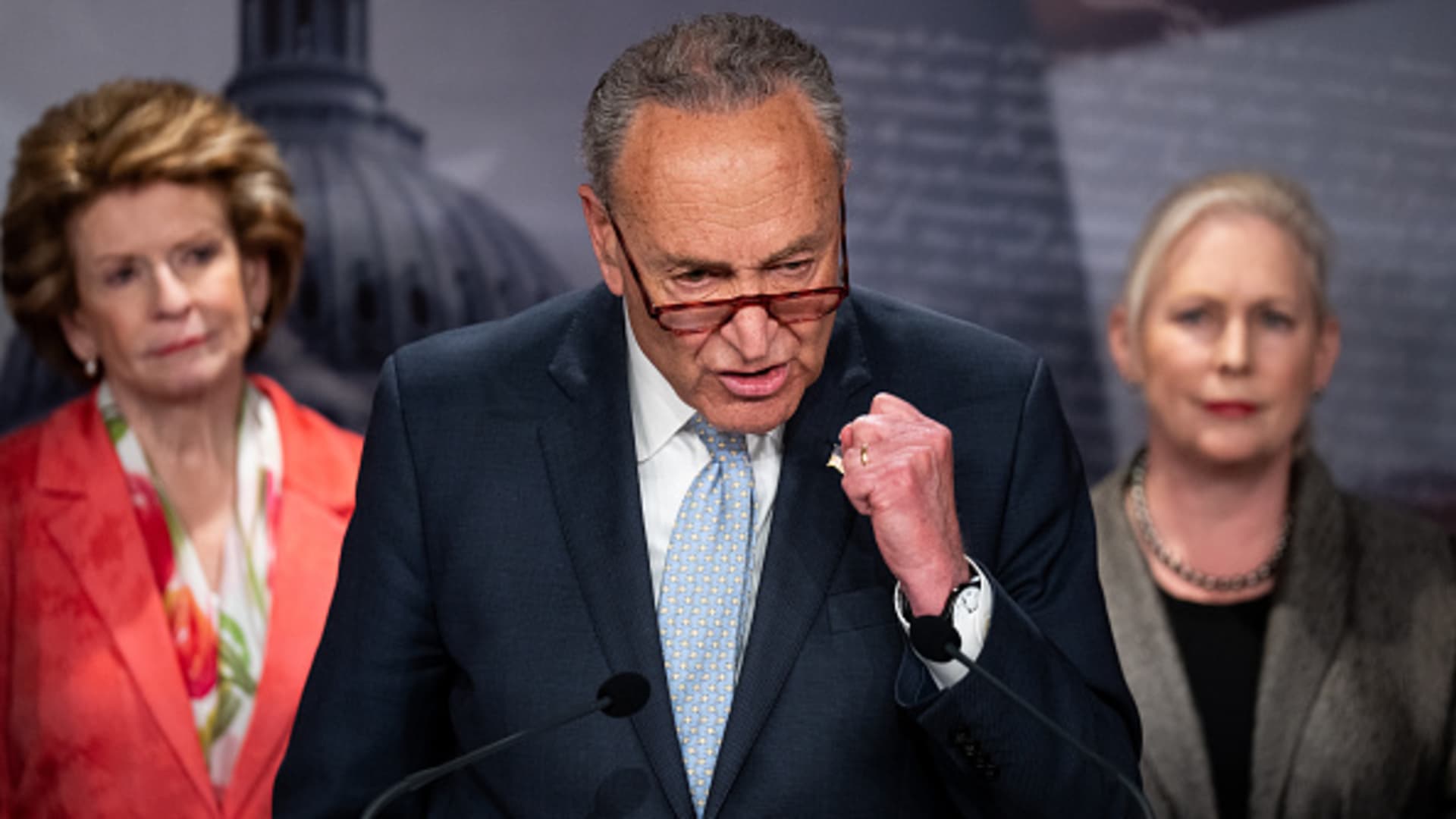
- Senate Republicans and one Democrat, Joe Manchin of West Virginia, blocked a bill that would enshrine abortion rights into federal law.
- Democrats appear to have little chance of passing any abortion rights legislation after a leaked draft opinion showed the Supreme Court is poised to overturn the landmark Roe v. Wade decision.
- The party is hoping to muster enthusiasm among abortion rights supporters to defend or expand its Senate majority in November's midterm elections.
Democrat Joe Manchin joined Republicans to block a bill Wednesday that would make the Roe v. Wade abortion rights decision law, dealing a setback to Democrats who are scrambling to preserve protections that the Supreme Court could soon toss out after nearly five decades.
Senate Majority Leader Chuck Schumer forged ahead with a vote on the Women's Health Protection Act of 2022, even though he knew it was doomed to stall. The New York Democrat aimed to put every senator's stance on the record after a draft court opinion that would overturn Roe leaked — inflaming the national abortion rights debate and energizing Democrats for November's midterm elections.
Get Connecticut local news, weather forecasts and entertainment stories to your inbox. Sign up for NBC Connecticut newsletters.
The chamber blocked the bill in a 51-49 vote. Underscoring the significance of the measure, Vice President Kamala Harris presided over the vote.
All Republicans in the Senate, which is split 50-50 between the GOP and Democrats, voted against advancing the bill Wednesday — leaving it short of the 60 votes needed to overcome a filibuster and allow a vote to proceed. Manchin of West Virginia also opposed the measure.
"Tens of millions of women are watching what will happen to the rights they've relied on for decades, and all of us will have to answer for this vote for the rest of our time in public office," Schumer said Wednesday on the Senate floor ahead of the vote.

The bill would bar states from banning abortion before fetal viability — generally considered 24 weeks — and in certain cases after that point when a medical provider determines a pregnancy poses a risk to a person's health. It would also stop states from taking steps to limit access to certain drugs and abortion services, and ban governments from requiring medically unnecessary doctor's visits.
Money Report
Democrats appear to have no path toward passing the bill, or a similar measure to cement federal abortion rights, unless they scrap the filibuster for legislation. Doing so would require only 51 votes to pass bills. At least two Democratic senators, Manchin and Kyrsten Sinema of Arizona, have signaled they will not vote to get rid of the filibuster.
For now, any push by Democrats to pass legislation appears designed to muster enthusiasm among voters who support abortion rights. Schumer doesn't have any Republican support for the legislation — even from Sens. Susan Collins of Maine and Lisa Murkowski of Alaska, who are considered the two GOP senators most likely to vote to protect abortion rights.
In a statement Wednesday, Collins said she believes the bill would do more than codify the protections set by Roe. She added that after the vote failed, she would "continue working with my colleagues on legislation to maintain — not expand or restrict — the current legal framework for abortion rights in this country."
Murkowski expressed similar concerns in her own statement, saying "Congress should codify the important protections from Roe and [the 1992 decision Planned Parenthood v.] Casey into law as they currently exist."
Democrats have called on midterm voters to elect candidates who will vote to enshrine the Roe v. Wade decision into federal law as they risk losing their razor-thin majority in November's elections. In a statement after the vote Wednesday, President Joe Biden contended Republicans "have chosen to stand in the way of Americans' rights to make the most personal decisions about their own bodies, families and lives."
"To protect the right to choose, voters need to elect more pro-choice senators this November, and return a pro-choice majority to the House," he said. "If they do, Congress can pass this bill in January, and put it on my desk, so I can sign it into law."
Democrats raised alarm after Senate Minority Leader Mitch McConnell, R-Ky., told USA Today that a nationwide abortion ban was "possible" if the court overturned Roe. As the court's decision would leave abortion laws up to states, Congress would have to act to bar it at the federal level.
Republicans likely could not garner the 60 votes needed to overcome a filibuster and ban abortion in the U.S. even if they won Senate control in November. McConnell also told USA Today that he would not push to bypass the filibuster "for any subject."
McConnell on Tuesday downplayed the chances of his party trying to bar abortion nationwide.
"I think it's safe to say there aren't 60 votes there at the federal level, no matter who happens to be in the majority, no matter who happens to be in the White House," he told reporters. "So I think the widespread sentiment of my conference is this issue will be dealt with at the state level."
Most Americans do not want the court to reconsider Roe in the first place, a poll released Wednesday found. More than half, or 57%, of adults say the Supreme Court should leave the decision alone, versus 36% who say the high court should revisit it, according to the Monmouth University survey of 807 people.
The vast majority of respondents oppose federal abortion restrictions. If the court overturns Roe, 44% of people want to see Congress pass a law allowing abortions nationwide, while another 43% would like to see laws left up to states, the poll found. Only 9% of respondents said they want lawmakers to approve a nationwide ban.
The prospect of Republicans barring abortion nationwide strengthened the resolve of one Senate Democrat, Bob Casey of Pennsylvania, who has supported some restrictive abortion laws during his Senate tenure.
His father, the late Democratic former Pennsylvania Gov. Bob Casey, backed state abortion restrictions that made him a defendant in Planned Parenthood v. Casey — a 1992 Supreme Court case that further solidified abortion rights after Roe.
The younger Casey is one of the most conservative Democrats on abortion rights, previously backing a ban on terminations performed after 20 weeks. He voted earlier this year to start debate on the Women's Health Protection Act, but he didn't commit at the time to supporting the bill itself.
Casey voted Wednesday to advance the abortion rights legislation after saying on Tuesday that he would support codifying Roe if the measure came to a final vote. He noted Tuesday that "the circumstances around the entire debate on abortion have changed" since the Senate last considered an abortion rights bill, citing the threat of a "categorical ban on abortion" if the GOP takes power after Roe is overturned.
Sen. Patty Murray, the No. 3 Democrat in the chamber and chair of the Health, Education, Labor and Pensions Committee, noted before the vote that a wave of state-level abortion bans would reverberate around the country as people could be forced to cross more than one state line to seek procedures. The Washington Democrat said a court decision to overturn Roe "limits a woman's entire economic future" and "takes away her ability to determine the direction of her own life."
Murray warned that women "are not going to forget" Wednesday's vote.






